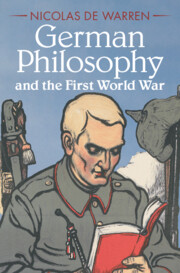Book contents
- German Philosophy and the First World War
- German Philosophy and the First World War
- Copyright page
- Dedication
- Contents
- Acknowledgments
- Introduction
- Chapter 1 The Genius of War, the Genius of Peace
- Chapter 2 Deutschtum und Judentum
- Chapter 3 I and Thou
- Chapter 4 More than Life
- Chapter 5 The Apocalypse of Hope
- Chapter 6 The Road to Damascus in the Age of Capitalism
- Chapter 7 From Death into Life
- Chapter 8 “A Journey around the World”
- Chapter 9 Martin Heidegger and the Titanic Struggle over Being
- Chapter 10 The Tragedy of the Person
- Bibliography
- Index
Chapter 7 - From Death into Life
Franz Rosenzweig’s Redemptions
Published online by Cambridge University Press: 30 March 2023
- German Philosophy and the First World War
- German Philosophy and the First World War
- Copyright page
- Dedication
- Contents
- Acknowledgments
- Introduction
- Chapter 1 The Genius of War, the Genius of Peace
- Chapter 2 Deutschtum und Judentum
- Chapter 3 I and Thou
- Chapter 4 More than Life
- Chapter 5 The Apocalypse of Hope
- Chapter 6 The Road to Damascus in the Age of Capitalism
- Chapter 7 From Death into Life
- Chapter 8 “A Journey around the World”
- Chapter 9 Martin Heidegger and the Titanic Struggle over Being
- Chapter 10 The Tragedy of the Person
- Bibliography
- Index
Summary
For countless soldiers, revelation as to the significance of their lives entwined with the fate of God, the Nation, or whatever Absolute claimed to give meaning to it all could occur in the most fearful of situations, but also in the most inauspicious of moments. For many, the war was experienced as a rite of passage and self-discovery. Many emerged from the war transfigured, set upon a new course of life. There were those, as with Ernst Jünger, who entered the war with an adventurous heart in search of something more than what domestic life had on offer; there were those, as with Karl Löwith, who did not go to war adventuring but in need of an ill-defined alternative, returning from the war scarred for life; there were those, as with Dietrich Mahnke, who through the war found confirmation of what had already been known but as yet existentially evidenced; there were those whose philosophical promise was extinguished on the battlefield, as with the deaths of Emil Lask and Adolf Reinach; and there were those who, philosophically active before 1914, disappeared from the stage of history after 1918, whose postwar quietude, as with Johannes Daubert, poignantly bespoke the extinguishing of thinking.
- Type
- Chapter
- Information
- German Philosophy and the First World War , pp. 226 - 271Publisher: Cambridge University PressPrint publication year: 2023

